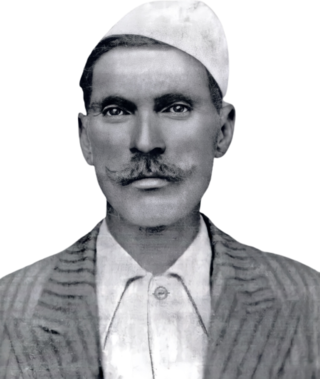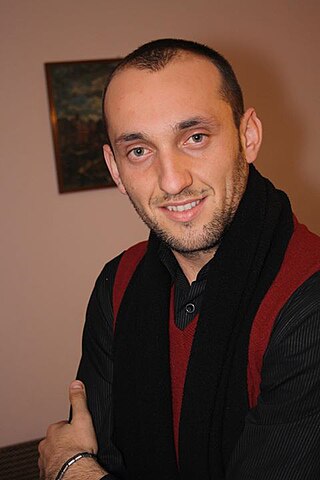
Gjon Marka Gjoni was an Albanian Catholic clan chieftain.

Gruda is a Northern Albanian tribe and historical tribal region in southeastern Montenegro, just north of Lake Skadar, which includes the small town of Tuzi, in Podgorica. It is inhabited by a majority of ethnic Albanians.

Pretash Zeka Ulaj (1882–1962) was an Albanian military figure in the Albanian Revolt of 1911. He was the bajraktar (flag-bearer) of Koja e Kuçit in Montenegro. He was distinguished Battle of Deçiq, fought near Tuzi in 1911 between Albanian highlanders and the Ottoman troops of Shefket Turgut Pasha.

The Battle of Deçiq was a battle between Albanian tribesmen and Ottoman forces during the Malësori uprising of 1911. It was a turning point for Albania's secession from the Ottoman Empire. Dedë Gjo Luli, the organiser of the Albanian tribal forces, raised the Albanian flag for the first time since 1479 on the mountain of Deçiq after the Albanians had achieved victory over the Ottoman Turks.
Nicolle Nikprelaj is an Albanian singer from Tuzi, Montenegro. Nikolle began his professional career in his late teens. He is now the lead singer for the Albanian folk group "Besa Trieshit", which has won first place in Albanian concerts and festivals in Montenegro, Kosovo and Albania. Nikprelaj plays several traditional instruments, including the lahuta, çiftelia, sharkia, and the bylbyli (flute). He plays traditional Albanian music featuring his instruments and vocals.
Opinga are traditional shoes worn by Albanians in Albania, Kosovo, North Macedonia (opinci), Montenegro, Greece, and the Arbëresh villages of Italy. They were also worn by countrymen in Romania (opinca), Serbia, Croatia, Bosnia and Herzegovina (opanak), Bulgaria (opinka), and other countries. They are made of a single leather skin, formed to the feet with leather or wool strips. A southern Albanian variety of opinga are the typical turned up leather shoes with red and black wool pompoms on the ends, which are often used for folk dances.

The Committee for the National Defence of Kosovo was an Albanian organization founded in Shkodër on 1 May 1918. It mainly consisted of the political exiles from Kosovo and was led by Hoxha Kadri from Pristina. It had existed in looser form since May 1915.
Andrea Vrana was an Albanian nobleman appointed by Manfred of Sicily as captain of Durazzo (Durrës). The Vrana family was based in the castle of Xibër village, today in the Mat District.

The Malissori uprising or the Albanian revolt of 1911 was one of many Albanian revolts in the Ottoman Empire and lasted from 24 March 1911 until 4 August 1911 in the region of Malësia.
Drago Siliqi was an Albanian poet, literary critic, and publisher. At the age of 14 he became a scout and then a partisan of the National Liberation Movement. He published his first collection of poetry, and then pursued university studies at the Maxim Gorky Literature Institute in Moscow.

Mark Lucgjonaj known by his pen name as Mark Pashku is an Albanian writer, journalist and professor of Albanian literature.

Adem Zaplluzha was one of the most prolific Kosovan Albanian poets. He completed his primary and secondary education in his hometown, Prizren, and graduated from the School of Pedagogy at the University of Pristina. After that he worked as a teacher for a while in several villages near Prizren and then as a legal translator at the Kosovan Electricity Corporation after that until the end of his career. He started writing and publishing literature from his childhood with his first poem being published in 1957 in the Pionieri literary magazine. At the Kosovan Electricity Corporation he co-founded the literary club 'Kosovan Poppies' which later published some of his works most notably in the 'Ngjyra e Kohës' anthology. His works were published in a wide variety of literary and non-literary publications in Kosovo, Albania, Macedonia and Romania.

Trieshi is a historical Albanian tribe (fis) and region in Montenegro above the right bank of the Cem river near the Albanian border in Tuzi Municipality. It is part of the region of Malësia.

Stath Melani was an Albanian Orthodox priest who participated in the Congress of Manastir and helped spread awareness of the Albanian written language in southern Albania. He was killed by a group of Greek nationalists near Përmet for insisting on the use of the Albanian language in the local Orthodox liturgy.

"Fustani" is a song recorded by Albanian singer and songwriter Elvana Gjata featuring Kosovo-Albanian rapper Capital T. It was written by both aforementioned artists and produced by Albanian producers Rzon and Arbre Blass. Swedish producer Johan Bejerholm further mastered and mixed the song. An official music video for "Fustani" was shot in Turkey and was uploaded on 29 June 2019 onto YouTube to accompany the single's release. A vibrant video, it features scenes of the pair performing to the song in the outskirts of Istanbul in variety of sets, and Elvana appearing with five different dresses throughout the entire video. The single experienced commercial success in Albania and went on to the country's number one The Top List chart. The record was further promoted by both artists with live performances at the Alba Festival 2019 in Zürich and soon after, at the Sunny Hill Festival 2019 in Pristina.
Mustafë Memeti is an Albanian imam in Switzerland.
Vladimir Prifti was an Albanian film director, screenwriter, and producer.











